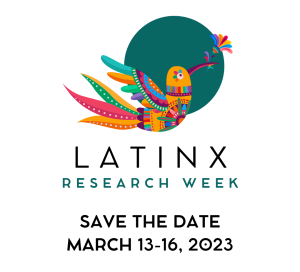Presented By: Puentes
Latinx Research Week Department of Psychology Sponsored Session

ANA PATRICIA ESQUEDA
Doctoral Candidate, Psychology
Title: COVID-19: Its effects on Latinos and the protective factors they may employ to cope
COVID-19 has laid bare the structural inequities that low-income communities of color face. Yet, public health recommendations for preventing the spread—staying at home and social distancing—only add another layer to the health disparities, socioeconomic disadvantages, and policy barriers experienced by communities of color. Guided by a resilience-based approach, this project employs a mixed methods design to gauge the effects of COVID-19 on Latinos whilst exploring the cultural and social influences that serve as protective factors in the face of psychological and structural barriers. As a first step, quantitative data was gathered through an online survey of 1595 Latinos from the United States and Puerto Rico. Initial analyses of the sample—which showcased vaccine hesitancy, collectivist ideals, and a general fear of the virus—were used to design a semi-structured interview protocol. The resulting qualitative data comes from one-on-one interviews with 60 Latinos from the United States. Integrated results regarding the effects of COVID, steps taken to combat COVID, concerns, cultural values, and hopes for the future illustrate the why/how often missing from quantitative samples and show that despite the many difficulties brought about by COVID-19 there is strength in the values and customs of Latino culture.
CARLOS VIVALDO
Doctoral Candidate, Biopsychology
Title: Joint Coding of Sound and Speed by Auditory Cortical Neuronal Ensembles
The ability to process and act upon incoming sounds during locomotion is critical for survival. Intriguingly, sound responses of auditory cortical neurons are on average weaker during locomotion as compared to immobility and these results have been suggested to reflect a computational resource allocation shift from auditory to visual processing. However, the evolutionary benefit of this hypothesis remains unclear. In particular, whether weaker sound-evoked responses during locomotion indeed reflect a reduced involvement of the auditory cortex, or whether they result from an alternative neural computation in this state remains unresolved. To address this question, we first used neural inactivation in behaving mice and found that the auditory cortex plays a critical role in sound-guided behavior during locomotion. To investigate the nature of this processing, we used two-photon calcium imaging of local excitatory auditory cortical neural populations in awake mice. We found that underlying a net inhibitory effect of locomotion on sound-evoked response magnitude, spatially intermingled neuronal subpopulations were differentially influenced by locomotion. Further, the net inhibitory effect of locomotion on sound-evoked responses was strongly shaped by elevated ongoing activity. Importantly, rather than reflecting enhanced “noise”, this ongoing activity reliably encoded the animal’s locomotion speed. Prediction analyses revealed that sound, locomotive state and their integration are strongly encoded by auditory cortical ensemble activity. Finally, we found consistent patterns of locomotion-sound integration in electrophysiologically recorded activity in freely moving rats. Together, our data suggest that auditory cortical ensembles are not simply suppressed by locomotion but rather encode it alongside sound information to support sound perception during locomotion.
Doctoral Candidate, Psychology
Title: COVID-19: Its effects on Latinos and the protective factors they may employ to cope
COVID-19 has laid bare the structural inequities that low-income communities of color face. Yet, public health recommendations for preventing the spread—staying at home and social distancing—only add another layer to the health disparities, socioeconomic disadvantages, and policy barriers experienced by communities of color. Guided by a resilience-based approach, this project employs a mixed methods design to gauge the effects of COVID-19 on Latinos whilst exploring the cultural and social influences that serve as protective factors in the face of psychological and structural barriers. As a first step, quantitative data was gathered through an online survey of 1595 Latinos from the United States and Puerto Rico. Initial analyses of the sample—which showcased vaccine hesitancy, collectivist ideals, and a general fear of the virus—were used to design a semi-structured interview protocol. The resulting qualitative data comes from one-on-one interviews with 60 Latinos from the United States. Integrated results regarding the effects of COVID, steps taken to combat COVID, concerns, cultural values, and hopes for the future illustrate the why/how often missing from quantitative samples and show that despite the many difficulties brought about by COVID-19 there is strength in the values and customs of Latino culture.
CARLOS VIVALDO
Doctoral Candidate, Biopsychology
Title: Joint Coding of Sound and Speed by Auditory Cortical Neuronal Ensembles
The ability to process and act upon incoming sounds during locomotion is critical for survival. Intriguingly, sound responses of auditory cortical neurons are on average weaker during locomotion as compared to immobility and these results have been suggested to reflect a computational resource allocation shift from auditory to visual processing. However, the evolutionary benefit of this hypothesis remains unclear. In particular, whether weaker sound-evoked responses during locomotion indeed reflect a reduced involvement of the auditory cortex, or whether they result from an alternative neural computation in this state remains unresolved. To address this question, we first used neural inactivation in behaving mice and found that the auditory cortex plays a critical role in sound-guided behavior during locomotion. To investigate the nature of this processing, we used two-photon calcium imaging of local excitatory auditory cortical neural populations in awake mice. We found that underlying a net inhibitory effect of locomotion on sound-evoked response magnitude, spatially intermingled neuronal subpopulations were differentially influenced by locomotion. Further, the net inhibitory effect of locomotion on sound-evoked responses was strongly shaped by elevated ongoing activity. Importantly, rather than reflecting enhanced “noise”, this ongoing activity reliably encoded the animal’s locomotion speed. Prediction analyses revealed that sound, locomotive state and their integration are strongly encoded by auditory cortical ensemble activity. Finally, we found consistent patterns of locomotion-sound integration in electrophysiologically recorded activity in freely moving rats. Together, our data suggest that auditory cortical ensembles are not simply suppressed by locomotion but rather encode it alongside sound information to support sound perception during locomotion.